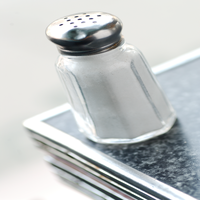Hidden Harbingers of Weight: Salt Intake and Obesity

In Healing, Meaning and Purpose, I discuss some of the evidence for four previously little recognized causes of obesity:
- Stress
- Salt intake
- Pesticides
- Viruses
Each of these has been widely discussed in the professional literature, but little has percolated out into the general population except in advertisements for agents like Cortislim. I remain skeptical about these products. Tinkering with just one of the 260 hormones and neurotransmitters implicated in the control of weight is unlikely to be crowned with success. And their ingredients may also have the potential for causing problems. Recent advertisements have also mentioned that one of these products may elevate mood. Sad to say, in the last year we have seen two people who developed manic symptoms after taking one of the supplements. We are urging colleagues to see if there are any other cases, or whether these two were just coincidental.
I recently mentioned some of the evidence for viruses as a cause of weight gain.
Now a new publication from the Universities of Helsinki and Kuopio is out in this month’s journal Progress in Cardiovascular Diseases, that provides powerful support for the salt hypothesis.
The researchers report that an average 30-35 % reduction in salt intake during 30 years in Finland was associated with an extraordinary 75 % to 80 % decrease in both stroke and coronary heart disease mortality in the population under 65 years. During the same period the life expectancy of both male and female Finns increased by 6 to 7 years.
As expected, reducing salt intake has a beneficial effect on blood pressure.
But in my view the most interesting finding of the study is the close link between salt intake and obesity.
As bartenders, pub landlords and tavern owners have known since the beginning of time, increasing a person’s intake of sodium produces a progressive increase in thirst. (You didn’t think that those peanuts on the bar were put there out of the goodness of the establishment’s heart did you??!)
The progressive increase in the average intake of salt explains the observed increase in the intake of sugar-containing beverages which, in turn, has caused a marked net increase in the intake of calories during the same period in the United States.
Here is an extraordinary statistic: Between 1977 and 2001, energy intake from sweetened beverages increased on the average by 135 % in the United States. During the same period, the energy intake from milk was reduced by 38 %. The net effect on energy intake was a 278 kcal increase per person a day. The American Heart Association has estimated that, to burn the average increase of 278 kcal a day and avoid the development or worsening of obesity, each American should now walk or vacuum 1 hour 10 minutes more every day than in 1977. As we all know, that has not happened.
In the decade from 1976-1980 to 1988-1994 the overall prevalence of obesity increased 61 % among men and 52 % among women. During 1999 to 2002, the prevalence of obesity was 120 % higher among men and 99 % higher among women as compared with the 1976 to 1980 figures. The increased intake of salt, through induction of thirst with increased intake of high-energy beverages has clearly made a significant contribution to the increase of obesity in the United States.
It is also of note that until 1983 the use of salt did not change or even showed a continuous decreasing trend in the United States. The prevalence of obesity was relatively low and remained essentially unchanged from early 1960s to early 1980s.
This new study suggests that a comprehensive reduction in salt intake, which would reduce the intake of high-energy beverages, would be a potentially powerful means in the so far failed attempts to combat obesity in industrialized societies.
There is now conclusive population-wide evidence that indicates that we could achieve powerful beneficial health effects simply by reducing our overall salt intake. These benefits include a decrease in obesity.
As an aside, the population-wide long-term experience from Finland indicated that a remarkable decrease in the salt intake has not caused any adverse effects.
A number of years ago we were engaged in some experiments in which we replaced regular table salt – sodium chloride – with potassium chloride. For the first three weeks food seemed rather tasteless. But then we all suddenly discovered a new universe of flavors that had previously been hidden under a thick coating of salt. So a dietary change does have a temporary effect on your taste buds.
Although the paper doesn’t say so, there is also some data that salt may itself increase cortisol release.
The bottom line?
We now have clear, empirical data to support three out of the four points that I made in Healing, Meaning and Purpose, and there is some less robust data for the fourth.
I urge you to try gradually to reduce your personal intake or salt, and to encourage your family and friends to do the same. I mentioned that food may initially seem a little less flavorful, but then things change rapidly and for the better.
And your body will love you for the change!






